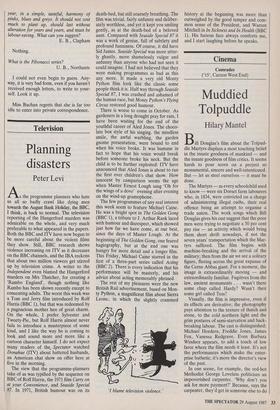Television
Planning disasters
Peter Levi
As the programme planners who hate us all so badly crawl like dying men towards the August Bank Holiday, the BBC, I think, is back to normal. The television reporting of the Hungerford murders was admirable on the whole, and very much preferable to what appeared in the papers. Both the BBC and ITV have now begun to be more careful about the violent films they show. Still, BBC research shows violence increasing on ITV as it decreases on the BBC channels, and the IBA reckons that about two million viewers get stirred up by television crime. A writer to the Independent even blamed the Hungerford murders on Mrs Thatcher, for creating a `Rambo England', though nothing like Rambo has been shown recently except to consenting adults. The worst this week was a Tom and Jerry film introduced by Rolf Harris (BBC 1), but that was redeemed by a pugnacious mother hen of great charm. On the whole, I prefer Sylvester and Tweety-Pie, but Rolf Harris almost never fails to introduce a masterpiece of some kind, and I like the way he is coming to look and sound more and more like a cartoon character himself. I do not expect many readers of the, Spectator watched Donahue (ITV) about battered husbands, an American chat show on offer here at five in the morning.
The view that the programme-planners take of us was typified by the sequence on BBC of Rolf Harris, the 1971 film Carry on at your Convenience, and Seaside Special 87. In 1971, British humour was on its death-bed, but still coarsely breathing. The film was trivial, fairly unfunny and deliber- ately worthless, and yet it kept you smiling gently, as at the death-bed of a beloved aunt. Compared with Seaside Special 87 it was a work of genius, full of subtlety and profound funniness. Of course, it did have Sid James. Seaside Special was more utter- ly ghastly, more shamelessly vulgar and unfunny than anyone who had not seen it could imagine. I had not believed that they were making programmes as bad as this any more. It made a very old Monty Python film look like the classic some people think it is. Half way through Seaside Special 87, I was crushed and ashamed of the human race, but Monty Python's Flying Circus restored good humour.
There is worse to come in October. As gardeners in a long drought pray for rain, I have been waiting for the end of the youthful career of Aled Jones. The choco- late box style of his singing. the mindless smile, the awful warbling, the garden gnome presentation, were bound to end when his voice broke. It was humane in fact to hope that his voice would break before someone broke his neck. But the child is to be further exploited: ITV have announced that Aled Jones is about to run the first ever children's chat show. How innocent by camparison seems the age when Master Ernest Lough sang 'Oh for the wings of a dove' evening after evening on the wind-up gramophone.
The few programmes of any real interest this week seem to feature Michael Caine. He was a bright spot in The Golden Gong (BBC 1), a tribute to J. Arthur Rank laced with humour and disrespect, which showed just how far we have come, at our best, since the days of Master Lough. At the beginning of The Golden Gong, one feared hagiography, but at the end one was hungry for more detail and a longer film. This Friday, Michael Caine starred in the first of a three-part series called Acting (BBC 2). There is every indication that his performance will be masterly, and his advice about acting memorably phrased. The rest of my pleasures were the new British Rail advertisement, based on Mon- ty Python, a magnificent film about Sierra Leone, in which the slightly crammed '1 blame television violence.' history at the beginning was more than outweighed by the good temper and com- mon sense of the President, and Warren Mitchell in In Sickness and In Health (BBC 1). His furious face always comforts me, and I start laughing before he speaks.










































 Previous page
Previous page